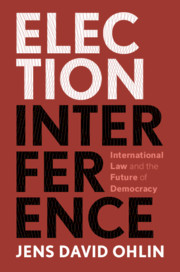Book contents
- Election Interference
- Election Interference
- Copyright page
- Dedication
- Contents
- Acknowledgements
- Introduction
- 1 What Is Election Interference?
- 2 Election Interference Is Not Cyber-War
- 3 Limits of the Sovereignty Framework
- 4 The Promise of Self-Determination
- 5 Foreign Electioneering and Transparency
- 6 Free Speech and Elections
- 7 The Value of Criminal Prosecutions
- 8 Soliciting Foreign Interference
- Conclusion
- Index
3 - Limits of the Sovereignty Framework
Published online by Cambridge University Press: 09 June 2020
- Election Interference
- Election Interference
- Copyright page
- Dedication
- Contents
- Acknowledgements
- Introduction
- 1 What Is Election Interference?
- 2 Election Interference Is Not Cyber-War
- 3 Limits of the Sovereignty Framework
- 4 The Promise of Self-Determination
- 5 Foreign Electioneering and Transparency
- 6 Free Speech and Elections
- 7 The Value of Criminal Prosecutions
- 8 Soliciting Foreign Interference
- Conclusion
- Index
Summary
When international lawyers talk about election interference and whether it violates international law, they usually ask whether it violates the sovereignty of the target state. Under this approach, the legal question is whether a foreign state has inappropriately intervened in the domestic affairs of the state holding the election in a way that violates the target state’s sovereignty. This sovereignty-based framework for evaluating election interference is by far the most common approach taken by mainstream international lawyers studying the issue. Although politicians and policy experts often jump to the cyber-war framework, the first reaction among sophisticated international lawyers is to ask whether election interference violates the sovereignty of the state holding the election. As the following sections will demonstrate, however, the sovereignty framework is poorly suited to resolving the case of foreign election interference, for several reasons. The doctrinal requirements for a violation of sovereignty require either a territorial intrusion, the element of coercion, or the usurpation of an inherently governmental function. However, none of these requirements is satisfied by the type of election interference that were at issue in the 2016 election. Election interference violates international law, but sovereignty is the wrong framework for understanding its illegality.
Keywords
- Type
- Chapter
- Information
- Election InterferenceInternational Law and the Future of Democracy, pp. 67 - 89Publisher: Cambridge University PressPrint publication year: 2020
- 1
- Cited by

